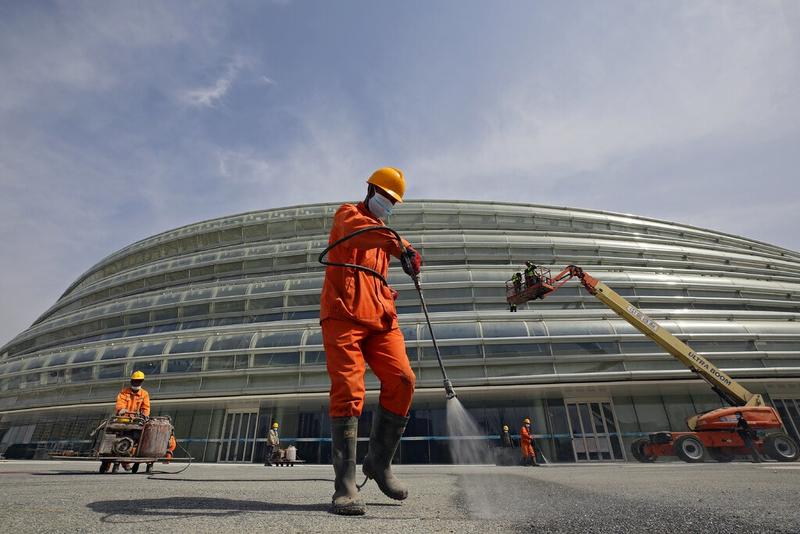 The National Speed Skating Oval is among the venues that will be used in the upcoming series of Beijing 2022 test events. (ANDY WONG / AP)
The National Speed Skating Oval is among the venues that will be used in the upcoming series of Beijing 2022 test events. (ANDY WONG / AP)
With venues ready to go and COVID-19 protocols coming into effect, Beijing 2022 is poised to present the world a taste of next year's Winter Olympics with a final series of test events.
The Winter Games will bar international spectators, with ticketing only available to residents in the Chinese mainland to reduce the risk of imported infections
Starting from Friday at the National Speed Skating Oval, 10 international events, three training weeks and two domestic test activities will take place at eight Beijing 2022 venues across three zones-downtown Beijing, its northwest Yanqing district and co-host Zhangjiakou, Hebei province-through the end of the year.
International athletes, officials and technical delegates will for the first time visit China on a large scale since the outbreak of the COVID-19 pandemic to get used to the rinks, slopes and tracks prepared for next year's Olympic and Paralympic Winter Games, making the upcoming tests critical for organizers, the International Olympic Committee and the International Paralympic Committee to trial a series of customized COVID-19 containment measures.
An estimated 2,000 foreign nationals will take part in the test events and training sessions within a bio-secure bubble, pending negative nucleic acid test results upon their arrival in China.
ALSO READ: Foreign spectators to be barred from Beijing Winter Olympics
They will only be permitted to travel between their designated accommodation and the sports venues on official transport vehicles, according to Beijing 2022 organizers.
"These are the final opportunities for most international athletes and technical staff to get familiar with the Olympic venues and environment, so the stakes are understandably high," Yao Hui, venue management director of the Beijing 2022 organizing committee, told a news conference on Monday.
"Also, the test events will provide the last opportunity for us to have all the preparatory work-including venues and facilities, timing and scoring, event scheduling, transportation and medical services-to be examined and improved to Games-time standards.
"The influx of foreign athletes and officials in big groups this time will also put pressure on our pandemic control protocols, which we expect to further adjust to ensure a better experience for all stakeholders during the Games."
According to protocols presented to the IOC last week, all athletes and participants in next year's Winter Olympics will be urged to be fully vaccinated before arriving in China. Those who arrive unvaccinated will have to observe a 21-day quarantine period as currently required for ordinary international visitors.
All Games' participants will be required to remain in the bubble at all times and be subject to daily medical tests.
The bubble operation will start on Jan 23, almost two weeks before the opening of the Olympics on Feb 4, and remain in effect until the end of the Paralympics on March 13.
The Games will bar international spectators, with ticketing only available to residents in the Chinese mainland to reduce the risk of imported infections.
Some of the competition sessions during the upcoming test series will be open to a limited number of local spectators who meet certain COVID-19 control requirements that are yet to be finalized.
"The hosting of the international test events that involves foreigners will increase COVID-19 risks but we've deployed a thorough containment plan and vigilant measures will be in place to guarantee the safety of all participants and particularly residents of the host cities," said Huang Chun, deputy director of the Beijing 2022 organizing committee's epidemic prevention and control office.
Busy schedule
As the opening event of the international test series, the Speed Skating China Open will see Chinese athletes race against their elite counterparts from South Korea and the Netherlands at the newly built National Speed Skating Oval in downtown Beijing's Olympic Park from Friday to Sunday.
The oval's operational team has finished making ice on its 400-meter track for a third time since the building's completion last year, guided by experienced Canadian technician Mark Messer, and is hosting athletes for pre-race training already, according to Wu Xiaonan, head of the venue operation.
"The running of the advanced ice-making system using carbon dioxide as an eco-friendly refrigerant is more efficient than ever," said Wu. "The chemistry between our local ice makers and the foreign experts has worked better as well."
As per domestic test events in April, most media will not be permitted inside the bubble, with journalists limited to online interviews and virtual news conferences.
Following the speed skating event, an Asian figure skating meet (Oct 13-17) and a short-track speed skating World Cup leg (Oct 21-24) will be held at the Capital Gymnasium, ahead of the world wheelchair curling championships (Oct 23-30) at the National Aquatics Center, aka the "Ice Cube" following its transformation. International time trials for bobsled and skeleton will run from Oct 25-26 at Yanqing's National Sliding Center.
Action on the sliding track will continue with a luge World Cup event (Nov 19-21) before snow events swoosh into action with snowboarding and freeski cross World Cup legs (Nov 27-28) at Zhangjiakou's Genting Snow Park.
READ MORE: Motto of Beijing Winter Games unveiled
Continental Cup events for ski jumping and Nordic combined (Dec 4-5), will test snow quality, weather forecast systems and mountain transport at Zhangjiakou's National Ski Jumping Center and National Cross-Country Skiing Center.
"All the facilities, equipment and health and safety plans for the test events have been put into place in the Zhangjiakou zone. We are now focusing on streamlining procedures for each and every operation," said Li Li, executive deputy director of Beijing 2022's Zhangjiakou operation center.


